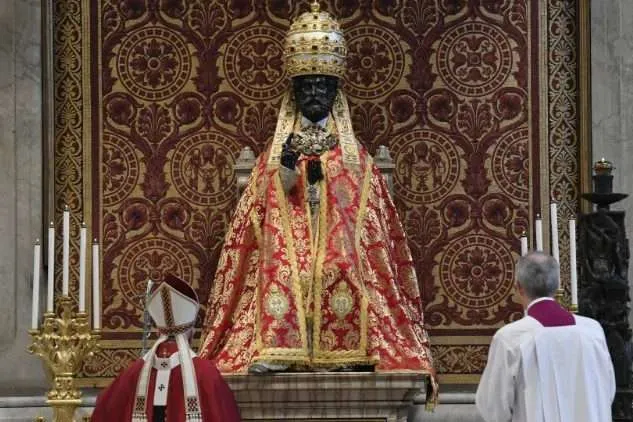Vatican City, 29 June, 2020 / 2:30 pm (ACI Africa).
Here is the full text of Pope Francis' homily on the Solemnity of Saints Peter and Paul delivered June 29, 2020 at the Basilica of St. Peter, and checked against delivery.
On the feast of the two Apostles of this city, I would like to share with you two key words: unity and prophecy.
Unity. We celebrate together two very different individuals: Peter, a fisherman who spent his days amid boats and nets, and Paul, a learned Pharisee who taught in synagogues. When they went forth on mission, Peter spoke to Jews, and Paul to pagans. And when their paths crossed, they could argue heatedly, as Paul is unashamed to admit in one of his letters (cf. Gal 2:11). In short, they were two very different people, yet they saw one another as brothers, as happens in close-knit families where there may be frequent arguments, but unfailing love. Yet the closeness that joined Peter and Paul did not come from natural inclinations, but from the Lord. He did not command us to like one another, but to love one another. He is the one who unites us, without making us all alike. He unites us in our differences.
Today’s first reading brings us to the source of this unity. It relates how the newly born Church was experiencing a moment of crisis: Herod was furious, a violent persecution had broken out, and the Apostle James had been killed. And now Peter had been arrested. The community seemed headless, everyone fearing for his life. Yet at that tragic moment no one ran away, no one thought about saving his own skin, no one abandoned the others, but all joined in prayer. From prayer they drew strength, from prayer came a unity more powerful than any threat. The text says that, “while Peter was kept in prison, the Church prayed fervently to God for him” (Acts 12:5). Unity is the fruit of prayer, for prayer allows the Holy Spirit to intervene, opening our hearts to hope, shortening distances and holding us together at times of difficulty.
Let us notice something else: at that dramatic moment, no one complained about Herod’s evil and his persecution. No one insulted Herod -- and we are so used to insulting those who hold responsibility. It is pointless, even tedious, for Christians to waste their time complaining about the world, about society, about everything that is not right. Complaints change nothing. Let us remember that complaints are the second door closed to the Holy Spirit, as I said on the day of Pentecost: the first is narcissism, the second discouragement, the third pessimism. Narcissism takes you to the mirror, to continually look at yourself; discouragement to complaints; pessimism to the dark, in the dark. These are the attitudes that close the door to the Holy Spirit. Those Christians did not cast blame; they prayed. In that community, no one said: “If Peter had been more careful, we would not be in this situation.” No one. Peter, as a human, had reasons to be criticized, but no one criticized him. They did not talk about Peter; they prayed for him. They did not talk about Peter behind his back, but they spoke to God. We today can ask: “Are we protecting our unity with prayer? The unity of the Church? Are we praying for one another?” What would happen if we prayed more and complained less? … with speech that was a little more calm. The same thing that happened to Peter in prison: now as then, so many closed doors would be opened, so many chains that bind would be broken. And we would be amazed, like the girl who — seeing Peter at the gate — did not open it, but ran inside, amazed with the joy of seeing Peter. Let us ask for the grace to be able to pray for one another. Saint Paul urged Christians to pray for everyone, especially those who govern (cf. 1 Tim 2:1-3). “But this ruler is to be …,” and the descriptions are many. I will not say them because this is not the time nor the place to say the qualifications that are heard against the rulers. Let God judge them, but let us pray for those who govern. Let us pray; they need prayer. This is a task that the Lord has entrusted to us. Are we carrying it out? Or do we simply talk, criticize, and do nothing? God expects that when we pray we will also be mindful of those who do not think as we do, those who have slammed the door in our face, those whom we find it hard to forgive. Only prayer unlocks chains, only prayer paves the way to unity.






